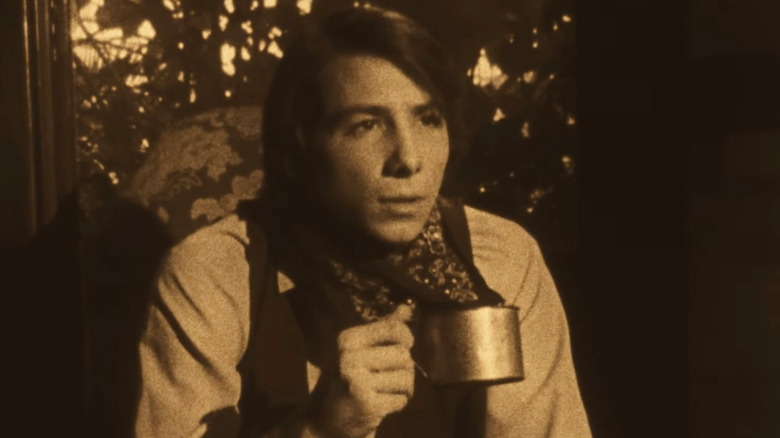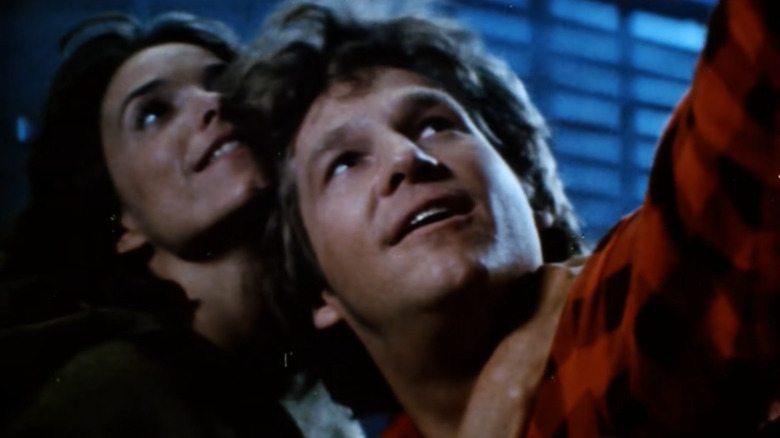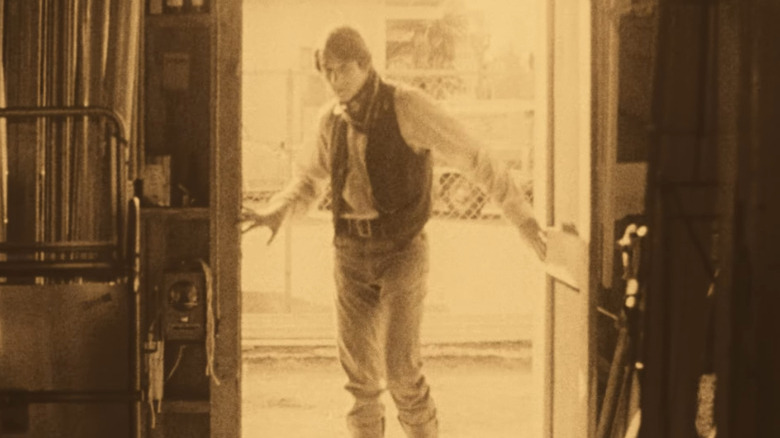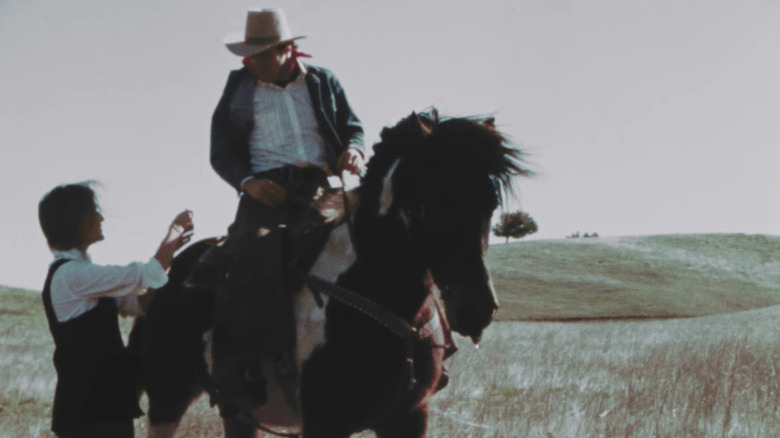Only One John Carpenter Movie Ever Won An Oscar (And You've Probably Never Heard Of It)
John Carpenter may not be a real-life carpenter, but he sure has built himself a legacy. It's just one made of movies, not wooden sticks. (Editor's Note: William Bibbiani went through 10 different drafts of this opening paragraph, and I swear to god, this was the best one.)
Seriously though, any genre movie fan will probably tell you that John Carpenter has made a staggering number of classic motion pictures. "Halloween" may not have invented the slasher genre, but it defined it. "The Thing" may not have invented gory monster effects, but it raised the bar and few films have even nudged it in the decades that followed. "Big Trouble in Little China" is one of the most subversive films of the 1980s, tearing down the whole "badass" genre of cinema by placing a musclebound white American hero in the center stage and then revealing him to be nothing more than a comic relief sidekick in a story about Chinese mythology that he's too damned ignorant to comprehend. And we could go on.
"Escape from New York" helped pioneer synthesizer scores in film. "They Live" is one of the most damning artistic indictments of the Reagan era in film history. "In the Mouth of Madness" is probably the greatest H.P. Lovecraft adaptation ever made, and it's not even really an H.P. Lovecraft adaptation. "Village of the Damned"... um ... exists? (Look, they can't all be winners.)
But despite a career full of timeless classics across multiple genres, the Academy of Motion Picture Arts & Sciences somehow managed to almost completely ignore John Carpenter's movies. You might even think, after looking at his feature filmography, that not a single one of his movies ever won an Oscar.
And yet ... you'd be wrong.
Carp and Star(man) Go to Vista del Oscar
John Carpenter himself was never nominated for an Oscar, and only one of his feature films was ever nominated. (That's right, "The Thing" didn't even get nominated for Best Makeup, and there were only two nominees that year — "Gandhi" and "The Quest for Fire," the latter of which won — so they didn't even have much of an excuse.)
The sci-fi romance "Starman," starring Jeff Bridges as an alien who takes on the form of Karen Allen's dead husband and falls in love with her as they travel across America to get to his spaceship, earned an Academy Award nomination for Best Actor. Bridges' performance, in which the actor appears to be learning about every facet of human interaction on the fly, was deservedly lauded and helped anchor the atypically sentimental Carpenter film. The so-called "Master of Horror" wasn't exactly known for his romance, unless you count the doomed Arnie Cunningham and his haunted 1958 Plymouth Fury in "Christine," but "Starman" proved he could direct just about anything. It's easy to label the film as an "E.T." knock-off, but even if you must give it that label, it's hard to deny that it's a good one.
Jeff Bridges lost the Best Actor Oscar to F. Murray Abraham in "Amadeus" which ... yeah, you know what? It's hard to complain about that. Bridges was great but Abraham's performance is an all-timer. Anyway, it's not the John Carpenter film we're here to talk about, since it didn't actually win an Academy Award.
The film that did was ...
The Resurrection of Broncho Billy
In 1969, University of Southern California film student John Carpenter edited, co-wrote, and composed the score for a short film called "The Resurrection of Broncho Billy." The film stars Johnny Crawford — former "Mickey Mouse Club" Mouseketeer and Emmy-nominated co-star on the Western TV series "The Rifleman" — as a young man who is obsessed with the wild west. Although he lives in the present, he dresses like an extra from a John Wayne movie, he hears the sound of cattle as he crosses the street through busy traffic, and if he approaches you straight on he readies himself for a potential shoot out ... even though he doesn't have any guns.
The 1960s are not kind to Billy. He loses his job, he's beaten up in an alleyway for looking different, and when a woman offers to sketch him like a real cowboy, he makes her uncomfortable by obsessing over the historical inaccuracies in her drawing. But when she walks away and the black and white film suddenly turns to color, he rides up on a horse he didn't have a second ago, and they head off into the sunset.
"The Resurrection of Broncho Billy" was directed by James R. Rokos with cinematography by Nick Castle, who would later star as Michael Myers in "Halloween" and direct the sci-fi classic "The Last Starfighter." But it has many elements familiar to Carpenter fans. His folksy score has a catchy leitmotif that fits practically every scene, which his future scores would be known for. And although Carpenter never directed a western — even though he REALLY wanted to — and many of his films are infused with Western elements: "Assault on Precinct 13" is a modern-day "Rio Bravo," "Big Trouble in Little China" was originally set in the wild west, and if "Ghosts of Mars" isn't just a Western with martian ghosts in it, what is?
How the western won
"The Resurrection of Broncho Billy" was a successful short film by any reasonable measure. Its one-week Oscar-qualifying theatrical run wound up running for two whole years. And of course, it won the Academy Award for Best Live-Action Short Subject, even though only the film's producer, John Longenecker, who also had a co-writing credit, actually took home a statue. That's pretty good for a class project that, according to Longenecker's acceptance speech, only earned him a "B" from USC Film School.
The Academy Award for Best Live-Action Short Subject hails back from the early days of the ceremony, when short films screened in between many theatrical features, and were a regular part of any filmgoer's experience. Nowadays the short subjects nominated for the Oscars aren't nearly as ubiquitous, but the award has still given many prominent filmmakers a valuable career boost, including Taylor Hackford ("Ray"), Martin McDonagh ("The Banshees of Inisherin"), Andrea Arnold ("American Honey"), Dean Parisot ("Galaxy Quest"), and John D. Hancock ("Bang the Drum Slowly"). Other well-known winners in the category include actors Peter Capaldi, Riz Ahmed, and Christine Lahti, as well as stand-up comic Steven Wright and famed oceanographer Jacques Cousteau.
So while John Carpenter didn't need an Oscar to have a long, celebrated, influential career — even though, come on, not even a nomination for the "Halloween" score? come on — at least he knew, right off the bat, along with all the other young filmmakers who worked on "The Resurrection of Broncho Billy," that his work was Oscar-worthy.



